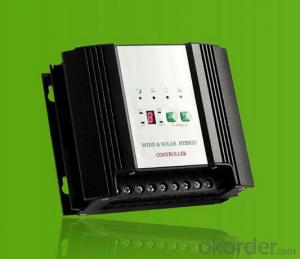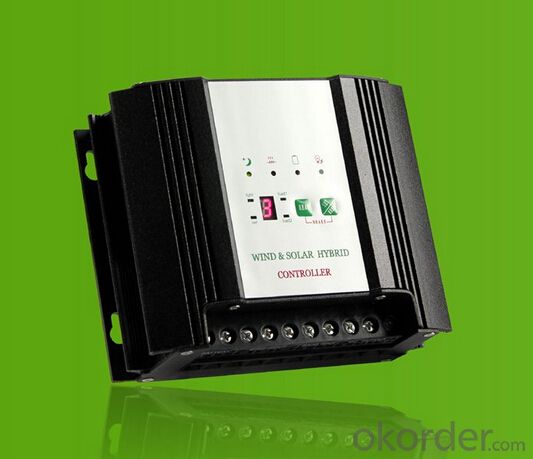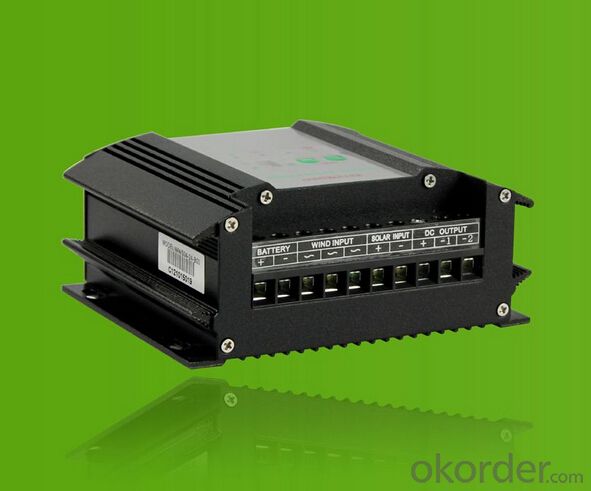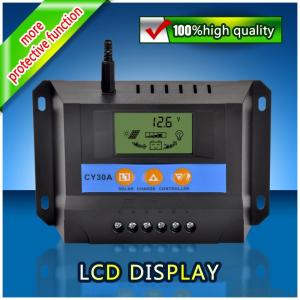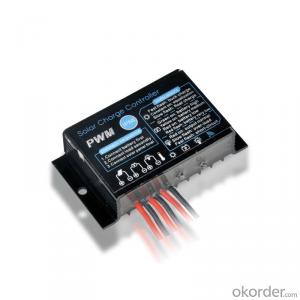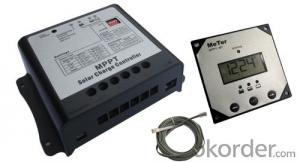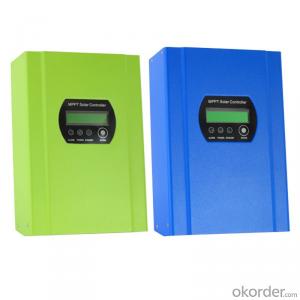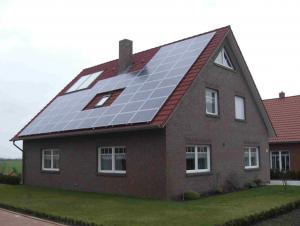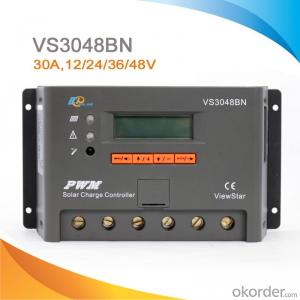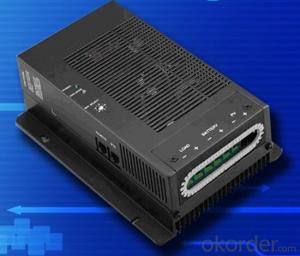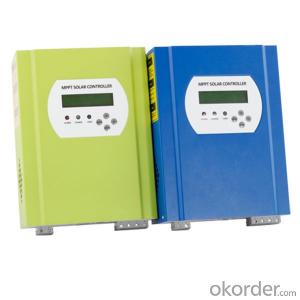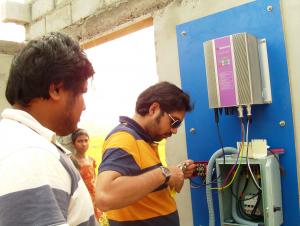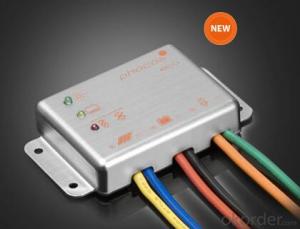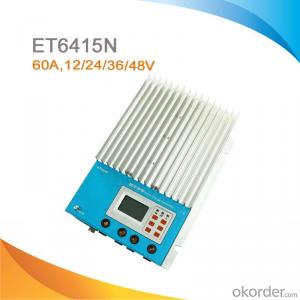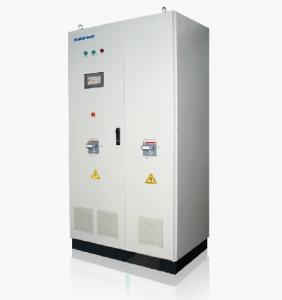PWM Solar Controllers - 10a/20a/30a MPPT Solar Controller, 12/24v Adjustable MPPT Solar Charge Controller with LCD Display
- Loading Port:
- China main port
- Payment Terms:
- TT OR LC
- Min Order Qty:
- 10 unit
- Supply Capability:
- 100000 unit/month
OKorder Service Pledge
OKorder Financial Service
You Might Also Like
1. General Description
This solar streetlight controller is specially designed for small-scale off-grid solar generation system. It is applicable to the solar hybrid streetlight system, solar monitor system and so on. The equipment could control solar cells charging to battery safely and efficiently.
2. Functions & Features
Efficient MPPT Charging Mode
Battery Maximum Charging Current Smart Limiting
DC Output,6 Output Modes
Output Take Short Circuit Protection
Using or Not Using Solar to Charge to Battery Could be Set Manually
Using or Not Using Output Could be Set Manually
LCD Display Multi-level Menu; Intelligent Button Settings
Battery Over-discharge & Over-Charge Protection
3. Product Models
LSLM10A-12V | LSLM20A-12V | LSLM30A-12V |
LSLM10A-24V | LSLM20A-24V | LSLM30A-24V |
4.Our Services
We are specialized in solar controller , wind solar controller and inverter, all the components for off gird solar power system. Any OEM or ODM products will be welcomed anytime.
5. FAQ
Q. How many with the MOQ?
A.100PCS
Q, What is the payment method:
A.T/T,L/C
Q, how long with the date of order
A. About 15-25 Days
Q. Where are you main market?
A. Our main market is South Africa and we provide more service to Southeast Asia, Middle East and South America.
Q: What are your certification?
A.CE, ISO, CCC
Q: How long with your warranty.
A. We offer inverter, solar lighting , solar generator one-years warranty ,Sola panel warranty 20 years.
Q: How about with you scale of factory ?
A.We are bigger OEM ( Original Equipment Manufacturer). We have 500 workers and managers .
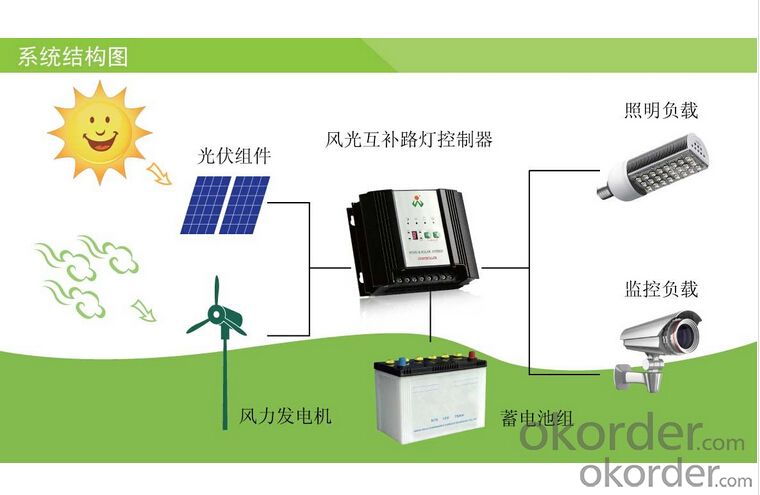
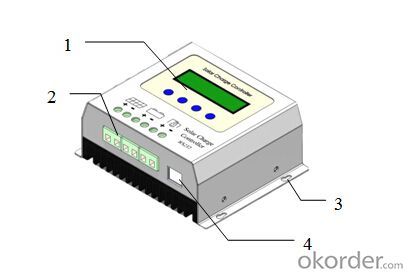
- Q: Can a solar controller be used with a solar-powered biomass plant?
- No, a solar controller cannot be used with a solar-powered biomass plant. A solar controller is specifically designed for regulating and optimizing the performance of solar panels and batteries, whereas a solar-powered biomass plant uses organic materials to generate electricity. These two technologies are fundamentally different and require different control systems.
- Q: How does a solar controller prevent damage to the solar panels from hail or storm events?
- A solar controller does not directly prevent damage to the solar panels from hail or storm events. However, it plays a crucial role in ensuring the safety of the solar panels during such events. One function of a solar controller is to regulate the charging and discharging of the batteries in a solar power system. This means that during a storm event or when hail is falling, the solar controller can detect the changes in voltage and current being generated by the solar panels. If the voltage or current exceeds a certain threshold, indicating a potential risk of damage to the panels, the solar controller can automatically disconnect the panels from the battery system. By disconnecting the panels from the battery system, the solar controller effectively isolates the solar panels from the rest of the system, minimizing the chances of damage occurring. This is important as hail or storm events can create high voltage surges or irregular power fluctuations that could potentially harm the panels or other components of the system. In addition, the solar controller can also provide real-time monitoring of the solar panels' performance and condition. This allows the system owner to keep track of any damage caused by hail or storm events. By being aware of any issues, the system owner can take appropriate action, such as repairing or replacing damaged panels, to ensure the continued efficient operation of the solar power system. Although a solar controller cannot completely prevent damage from hail or storm events, its ability to disconnect the panels from the system and provide monitoring capabilities significantly reduces the risk of damage and helps to protect the investment in solar panels.
- Q: How does a solar controller handle overvoltage protection?
- A solar controller handles overvoltage protection by monitoring the voltage level of the solar panels or batteries connected to it. If the voltage exceeds a certain threshold, the controller automatically shuts off the charging process to prevent damage to the batteries or other connected devices. This protection mechanism ensures that the system operates within safe voltage limits and extends the lifespan of the equipment.
- Q: Can a solar controller be used with a solar-powered parking meter?
- Yes, a solar controller can be used with a solar-powered parking meter. A solar controller is responsible for regulating the flow of electricity from the solar panels to the battery or load, ensuring efficient charging and preventing overcharging or damage. In the case of a solar-powered parking meter, a solar controller would help manage the energy generated by the solar panels and ensure it is properly stored and utilized to power the meter's operations.
- Q: What is the maximum charging current that a solar controller can provide to batteries?
- The maximum charging current that a solar controller can provide to batteries depends on the specific model and its specifications. Generally, solar controllers can deliver charging currents ranging from a few amps to several tens of amps, depending on the size and capacity of the system. It is essential to refer to the manufacturer's specifications to determine the maximum charging current for a particular solar controller.
- Q: Can a solar controller be used with solar-powered public transportation systems?
- Yes, a solar controller can be used with solar-powered public transportation systems. A solar controller is designed to regulate and optimize the charging and discharging of batteries connected to solar panels. In solar-powered public transportation systems, solar controllers can effectively manage the energy flow from the solar panels to the batteries, ensuring efficient utilization of solar power for the transportation system.
- Q: What is the maximum charging time a solar controller can handle?
- The maximum charging time a solar controller can handle will vary depending on the specific model and its capabilities. However, most solar controllers can handle continuous charging for extended periods of time without any issues.
- Q: How does a solar controller handle variable sunlight conditions?
- Efficiently regulating and optimizing the charging process of a solar panel system is the main purpose of a solar controller. Equipped with advanced technology, it effectively handles varying sunlight conditions. One of the main advantages of a solar controller is its ability to adapt the charging parameters based on the available sunlight. When there is a high intensity of sunlight, the controller permits the solar panels to work at their highest power output, guaranteeing the battery bank achieves optimal charging. Conversely, when there is low sunlight or partial shading of the panels, the controller actively adjusts the charging algorithm to prevent overcharging or damage to the battery. To effectively handle changing sunlight conditions, a solar controller also incorporates a Maximum Power Point Tracking (MPPT) algorithm. This feature enables the controller to trace and extract the maximum power from the solar panels, even when sunlight conditions are fluctuating. By continuously monitoring the voltage and current output of the panels, the MPPT algorithm adjusts the charging voltage to ensure the solar panels function with peak efficiency, delivering the maximum power possible to the battery, regardless of sunlight levels. Moreover, many solar controllers are equipped with built-in temperature compensation capabilities. This functionality allows the controller to modify the charging voltage according to the ambient temperature. As temperature influences the performance of the solar panels and the battery, the solar controller guarantees that the charging parameters are optimized to accommodate these temperature variations. This helps to maintain the efficiency of the system and prolong the lifespan of the battery. In conclusion, a solar controller effectively handles varying sunlight conditions by adjusting charging parameters, utilizing MPPT algorithms to extract maximum power, and incorporating temperature compensation to optimize the charging process. With these features, a solar controller ensures that the solar panel system operates at its utmost efficiency, irrespective of changing sunlight conditions, and provides optimal charging to the battery bank.
- Q: Can a solar controller be used with both 12V and 24V systems?
- Yes, a solar controller can be used with both 12V and 24V systems. Most modern solar controllers are designed to be compatible with multiple voltage systems and have the ability to automatically adjust their settings based on the voltage of the system they are connected to.
- Q: How does a solar controller handle temperature fluctuations in the environment?
- The purpose of a solar controller is to manage temperature fluctuations in the environment through the utilization of various mechanisms and features. Regulating and optimizing the charging and discharging of batteries in a solar power system is one of the primary functions of a solar controller. To guarantee efficient operation in varying temperatures, solar controllers typically incorporate temperature sensors. These sensors monitor the surrounding temperature and provide feedback to the controller. Based on this information, the controller can adjust its charging and discharging parameters accordingly. In cold temperatures, the solar controller may increase the charging voltage to compensate for reduced battery performance. This prevents insufficient charging and ensures that the batteries receive the necessary charge. Additionally, the controller may modify the charging algorithm to allow for a longer absorption phase, which aids in fully charging the batteries even at lower temperatures. On the other hand, in hot temperatures, the solar controller may decrease the charging voltage to prevent overcharging and potential damage to the batteries. It may also shorten the absorption phase to prevent excessive heat buildup. These temperature compensation techniques assist in maintaining optimal battery performance and prolonging their lifespan. Moreover, advanced solar controllers may include additional features to mitigate temperature-related issues. For example, some controllers are equipped with temperature sensors specifically for the solar panels themselves. These sensors monitor the panel temperature and adjust the maximum power point tracking (MPPT) algorithm accordingly. By optimizing the panel's output voltage and current based on temperature, the controller ensures maximum energy conversion efficiency. In conclusion, a solar controller effectively manages temperature fluctuations in the environment by utilizing temperature sensors and implementing temperature compensation techniques. This enables the controller to adapt its charging and discharging parameters to different temperature conditions, ensuring optimal performance and longevity of the batteries in a solar power system.
Send your message to us
PWM Solar Controllers - 10a/20a/30a MPPT Solar Controller, 12/24v Adjustable MPPT Solar Charge Controller with LCD Display
- Loading Port:
- China main port
- Payment Terms:
- TT OR LC
- Min Order Qty:
- 10 unit
- Supply Capability:
- 100000 unit/month
OKorder Service Pledge
OKorder Financial Service
Similar products
Hot products
Hot Searches
Related keywords
